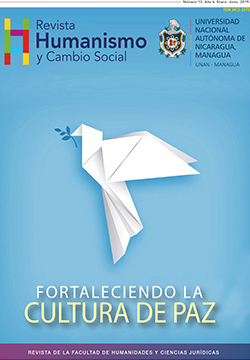Re-thinking a pedagogy for peace from the University, (Reflections)
DOI:
https://doi.org/10.5377/hcs.v0i13.8832Keywords:
Culture of peace, common good, teaching leadership, pedagogy for peaceAbstract
This work is a contribution that as academics we are making from the University on the theme of promoting a culture of peace and coexistence, since 2018 on the agenda as a result of the political crisis that was immersed in Nicaraguan society. This proposal problematizes the place and role of university professors in the search for discursive practices that channel differences and/or contradictions through civic channels, knowing that society in general wants peace in order to continue improving their material and spiritual living conditions. The purpose of this research is to answer questions such as, are we really working on an individual and/or collective agenda in terms of strengthening teacher leadership and contributing in a concrete manner to the solution of the problems facing Nicaraguan society as a result of the political crisis that began on April 18? Do we believe in the values of a culture of peace (already institutionalized through Decree-Law 985) as a convergence for the strengthening of the common good? Finally, are we developing pedagogical strategies in the classrooms for the promotion of values that contribute to a positive, constructive-positive and tolerant vision in the students, seeking to counteract the destructive discourses that the media bubbles inoculate in the minds of young people on a daily basis?
Downloads
References
Beltranena de Padilla M, L (2010); que se entiende por el bien común. UNIVERSIDAD FRANCISCO DE MARROQUIN, Facultad de Derecho, Guatemala. En https://derecho.ufm.edu/que-se entiende-por-el-bien-comun/).
Freire, P. (1983) Extensión o comunicación. La concientización en el medio rural. México: Siglo XXI Editores.
Hernández Arteaga, I. et.al (enero-junio de 2017). Cultura de paz: Una construcción educativa aporte teórico. Revista Historia de la Educación Latinoamericana. 19 (28). Pp.149-172. Ley N° 985. La Gaceta. Diario Oficial. Managua, Nicaragua, 28 de enero de 2019.
Moncada, J.S. (agosto de 2008) La Universidad. Un acercamiento histórico-filosófico. Ideas y Valores, (137), Pp. 131-148) Nohlen, D. y Schultze, R-O et al. (2006). Diccionario de Ciencia Política. Teorías, métodos, conceptos. México: Porrúa/El Colegio de Veracruz.
Ortiz Millán, G. (octubre 2016) sobre la distinción entre ética y moral. ISONOMIA, (45), Pp. 119-125.
Pariser, E. (2017) El Filtro Burbuja. Cómo la red decide lo que leemos y lo que pensamos. Barcelona: Taurus.
Rawls, J. (1979). Teoría de la justicia. México: Fondo de Cultura Económica.




